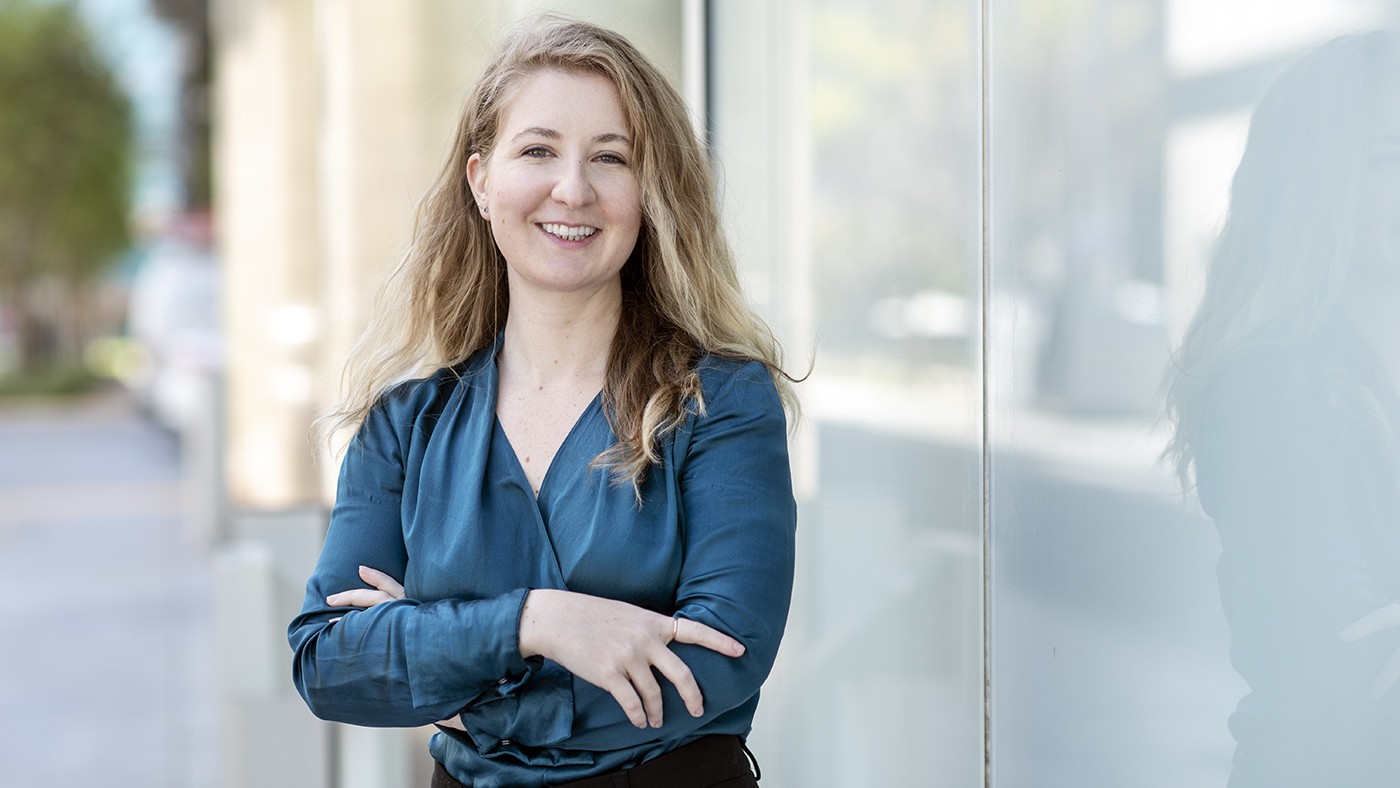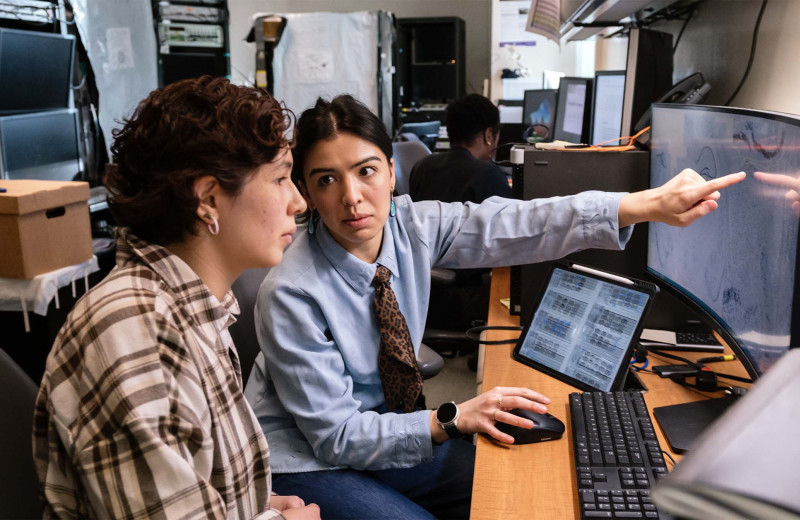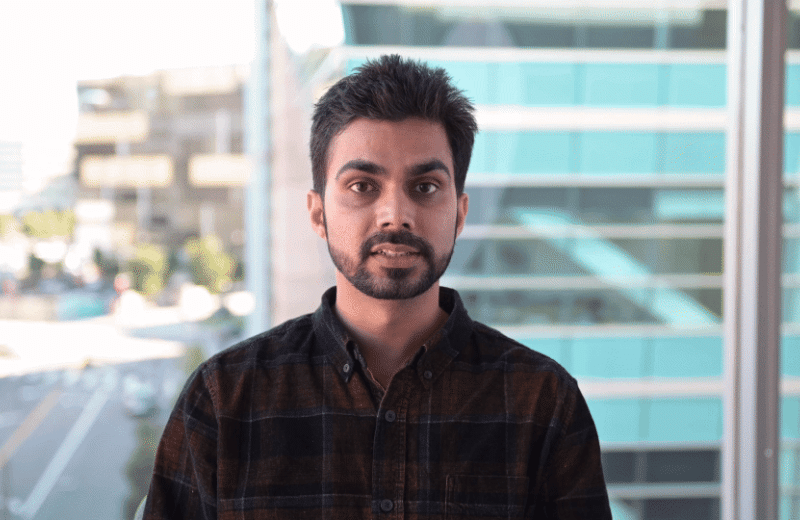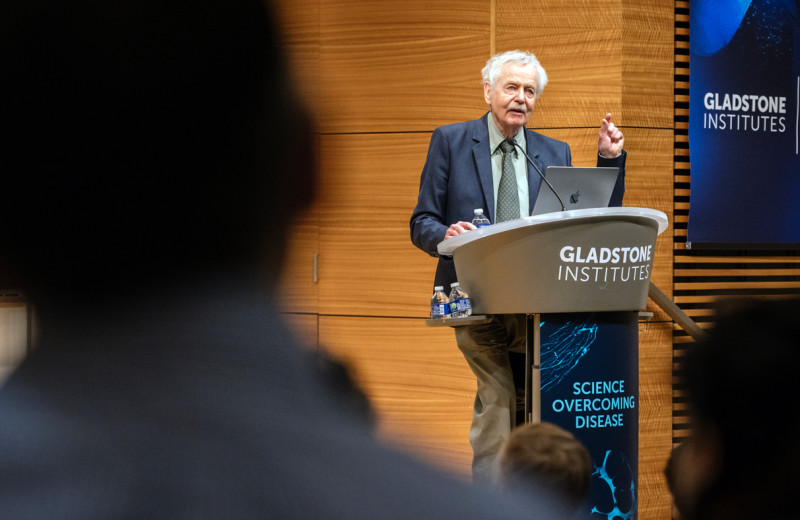Gladstone NOW: The Campaign Join Us on the Journey✕

Randi Mott had been searching for her ideal role for a while before finding Gladstone. Learn why she loves the organizational culture.
Randi Mott is the administrative program manager for the director of the Gladstone Institute of Neurological Disease. She grew up on Florida’s Gulf coast, where she organized Olympic sailing regattas and studied art and business management. She moved to San Francisco in 2016 and has been at Gladstone since 2018.
What brought you to Gladstone?
I was determined to find a role that would challenge me, and I also wanted to spend my time at a place where I fit in, enjoyed my role, the field I was working in, and those I worked with. I took a job as a commercial property manager while I interviewed to see what was out there. After about a year, I had nearly given up on trying to find what I was looking for. Not long after, I received a call from a recruiter who found me on LinkedIn. I told her that I wasn’t on the job market but she was persistent and wouldn’t let me off the phone, so I interviewed with Lennart Mucke, the director of the Gladstone Institute of Neurological Disease later that afternoon.
My curiosity piqued as I walked into the research building. Gladstone’s history was beautifully displayed in the lobby, which included a bust of the late J. David Gladstone. Having never been in a research environment before, the walk to my interview became increasingly foreign land to me. Busy scientists in white coats hovered over lab benches while a group of researchers standing in the doorway next to where I was seated discussed mouse behaviors.
In my interview with Lennart, it became clear to me that my experience leading up to this point would allow me to bring a unique set of skills to the role, and that Gladstone would be a place where I could thrive with infinite access to learning.
It’s a good feeling when a work environment feels like a place where you’d want to hang out and see what is going on.
What do you like about working at Gladstone?
Gladstone curates truly special people, so the energy here is infectious. There is so much creativity and open mindedness. The culture at Gladstone is unparalleled.
What is your role at Gladstone?
I oversee the administrative and operational affairs in the office of the founding director of the Gladstone Institute of Neurological Disease. I format and edit grants, manuscripts, scientific figures, and other complex documents, while mentoring, recruiting, and training administrative assistants. I also organize projects, symposiums, events, fundraising, and scientific recruitments for the institute.
What do you like most about your job?
I enjoy being a part of the manuscript preparation and submission process with Lennart and the lab members. It can be a long and grueling process, especially if there are multiple rejections and resubmissions before a paper is accepted, but it’s incredibly rewarding to be a part of, and inspiring to witness the degree of determination from everyone involved. Research is not for the faint of heart.
In your opinion, what makes an effective executive or administrative assistant?
No administrative support position is the same, so I think it’s key to make the position your own. It’s important to bring an adaptable and dynamic approach to the table, observing how others operate best to keep the office as productive as possible. Work to fully understand each process, system, and assignment from start to finish and know how it relates to others before, during, and after the assignment leaves your hands. The more you understand your work as it relates to the bigger picture and those around you, the more effective you will become in your role.
Who has influenced your career?
In the early stages of my career, I was pulled from my bookkeeper position to be the executive assistant for the owner of a 5-star restaurant chain, who was known to have incredibly high standards and be impossible to keep up with. It was one of those “sink or swim” type situations. I had basically no prior experience outside of working at one of his restaurants and bookkeeping. Yet, he would do things like storm into the office and say he wanted to bid on and host the upcoming Olympic sailing regatta, so I needed to “figure out how to handle it.” He trusted me fully and believed I was capable of anything, and I surprised myself time and time again because of that.
After that experience, when I was interviewing for the executive assistant position at Gladstone, I knew that I’d be stepping into an influential working relationship where mediocrity doesn’t exist and the work would be so much bigger than me. In the nearly 3 years that I have worked with Lennart, I’ve had the pleasure of supporting a boss who is my staunchest advocate and proves that a role can be incredibly challenging, yet fun, when you are part of a great team.
Have you developed any fun pandemic hobbies?
My collection of exotic orchids has become rather robust. I also refinished a George Nelson mid-century modern cabinet that turned out quite nice, and picked up French language lessons…again.
If you could learn to do anything, what would it be?
Speak multiple languages. I’m in awe of those who can! I find it so hard to re-train that part of my brain as an adult.
What is your hidden or unique talent?
I don’t know if I would refer to them as talents since I started out as a beginner and progressed from there, but I have become pretty good at painting, rehabbing sick plants, and arm balances.
If you could meet any scientist from any point in time, who would it be and why?
I would love to have been a student in the class of Professor Paul Pfurtscheller, an Austrian zoologist and natural history artist. Without any formal art training, he used an enormously demanding technique to create zoological and botanical wall charts to illustrate his teaching lessons. He must have been a really special teacher.
I also wish I could go back in time and sit in one of Ernst Haeckel’s lectures or peruse his research lab and art studio. He was a 19th-century physician, marine biologist, and zoologist who made many advances in the natural sciences in general, but even more fascinating, he discovered dozens of new marine species and recorded the tiny organisms by creating these exquisitely detailed renderings that captured their constructed skeletons with mathematical precision. Sheer brilliance!
Want to Join the Team?
Our people are our most important asset. We offer a wide array of career opportunities both in our administrative offices and in our labs.
Explore CareersVoices of Outstanding Mentorship
Voices of Outstanding Mentorship
Three recipients of Gladstone’s Outstanding Mentoring Award share their personal approaches to mentorship and reflect how this passion has shaped their own growth as leaders.
Profile Roan Lab Graduate Students and PostdocsMeet Gladstone: Shyam Jinagal
Meet Gladstone: Shyam Jinagal
Shyam Jinagal explores how genetics, aging, and regeneration shape the heart—and how those insights could one day restore heart function after injury.
Graduate Students and Postdocs Profile Cardiovascular Disease Srivastava LabA Sculptor of Modern Regenerative Medicine
A Sculptor of Modern Regenerative Medicine
Among his myriad accomplishments, Rudolf Jaenisch—winner of the 2025 Ogawa-Yamanaka Stem Cell Prize—was the first to demonstrate the potential of induced pluripotent stem cells to treat disease.
Awards Ogawa Stem Cell Prize Profile Regenerative Medicine Stem Cells/iPSCs



